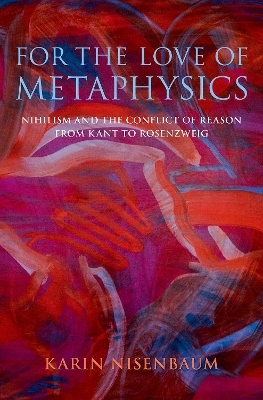
For the Love of Metaphysics
Oxford University Press Inc (Verlag)
978-0-19-068064-0 (ISBN)
In his Critique of Pure Reason, Kant argued that human reason is inherently conflicted, because it demands a form of unconditioned knowledge which is unattainable; his solution to this conflict of reason relies on the idea that reason's quest for the unconditioned can only be realized practically. Karin Nisenbaum recommends viewing this conflict of reason, and Kant's solution to this conflict, as the central problem shaping the contours of post-Kantian German Idealism. She contends that the rise and fall of German Idealism is to be told as a story about the different interpretations, appropriations, and radicalization of Kant's prioritizing of the practical.
The first part of the book explains why Kant's critics and followers came to understand the aim of Kant's critical philosophy in light of the conflict of reason. According to Nisenbaum, F. H. Jacobi and Salomon Maimon set the stage for the reception of Kant's critical philosophy by conceiving its aim in terms of meeting reason's demand for unconditioned knowledge, and by understanding the conflict of reason as a conflict between thinking and acting, or knowing and willing. The manner in which the post-Kantian German Idealists radicalized Kant's prioritizing of the practical is the central topic of the second part of the book, which focuses on works by J.G. Fichte and F.W.J. Schelling. The third part clarifies why, in order to solve the conflict of reason, Schelling and Rosenzweig developed the view that human experience is grounded in three irreducible elements--God, the natural world, and human beings--which relate in three temporal dimensions: Creation, Revelation, and Redemption.
Karin Nisenbaum is Assistant Professor of Philosophy at Colgate University. Her research focuses on issues of metaphysics and practical reason in Kant's critical philosophy, as developed by post-Kantian thinkers such as Fichte and Schelling and by Jewish philosophers such as Maimon and Rosenzweig.
Acknowledgments
Introduction
Part I. Nihilism, Reason, and Freedom in the Early Reception of Kant's Critical Philosophy
Chapter 1. The Legacy of Friedrich Heinrich Jacobi: Restoring Human Reason to Its Full Measure
Chapter 2. The Legacy of Salomon Maimon: Philosophy as a System Actualized in Freedom
Part II. The Primacy of the Practical in Early Fichte and Schelling
Chapter 3. Kant's Deduction of Freedom: The Performative and First-Personal Aspect of Transcendental Arguments
Chapter 4. The Unconditioned in Human Knowledge: A Theoretical Puzzle, or a Practical Demand?
Part III. Nihilism and the Affirmation of the World in Schelling and Rosenzweig
Chapter 5. Why Is There a Realm of Experience at All? Love and Defiance as the Two Forms of Human Individuation
Chapter 6. The Star of Redemption as a System of Philosophy: The Human Word as a Response to the Word of God, and Human Words and Actions as the Means for the Unification of God
Conclusion
Bibliography
Index
| Erscheinungsdatum | 06.10.2018 |
|---|---|
| Verlagsort | New York |
| Sprache | englisch |
| Maße | 239 x 157 mm |
| Gewicht | 454 g |
| Themenwelt | Geisteswissenschaften ► Philosophie ► Allgemeines / Lexika |
| Geisteswissenschaften ► Philosophie ► Geschichte der Philosophie | |
| Geisteswissenschaften ► Philosophie ► Metaphysik / Ontologie | |
| Geisteswissenschaften ► Philosophie ► Philosophie der Neuzeit | |
| Sozialwissenschaften | |
| ISBN-10 | 0-19-068064-4 / 0190680644 |
| ISBN-13 | 978-0-19-068064-0 / 9780190680640 |
| Zustand | Neuware |
| Haben Sie eine Frage zum Produkt? |
aus dem Bereich


